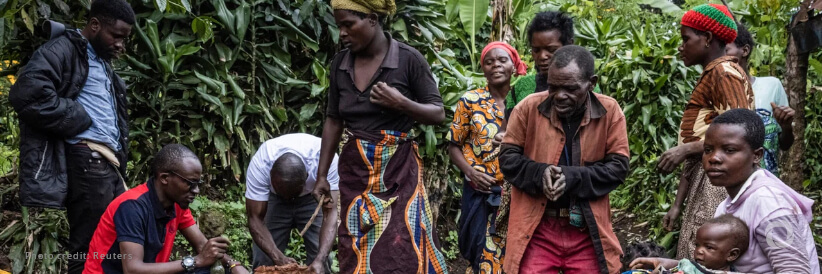In recent days, the security situation around the city of Uvira, in the South Kivu province of the Democratic Republic of Congo (DRC), has rapidly deteriorated. Residents described scenes of pillaging by looters, increased violence, and clashes within the city between the Congolese army (FARDC) and Wazalendo fighters. Medical facilities have not been spared from gunfire, impacting patient care.
“When we heard the shots, we had to take cover quickly, as did the patients, and we had to stop our activities, which delayed their care and treatment,” said a Doctors Without Borders/Médecins Sans Frontières (MSF) staff member who was present at the onset of the clashes. “The next day, gunfire was coming from everywhere, so we had to stay at home. But the hospital [Uvira’s general referral hospital] was starting to receive a lot of wounded, so we came to the hospital as reinforcements, taking the risk of catching a stray bullet.”
The situation in Uvira is part of the broader escalation in eastern DRC this year. Since February 17, the region’s hospitals have faced an influx of wounded people, receiving around 10 patients a day per structure. Despite the insecurity, Ministry of Health staff continue to provide emergency care, and a large number of staff from other hospital departments have come to help with surgery and the operating theater. More than a hundred injured people have been treated in just a few days.
“This week, the city became unlivable, with gunfire from morning to night,” explained an MSF staff member. “I’ve lost track of the days because we have all been affected. Some of my colleagues were victims of all this chaos, some have been robbed at home by armed men.”
Medical care is under threat
The chaos in Uvira and the incessant gunfire have severely impacted roads and people’s movements. This lack of mobility prevents even emergency responders from intervening in time. Ambulances face difficulty moving around, but they continue to pick up lifeless bodies on the roads whenever they can.
On several occasions, the general referral hospital of Uvira has been caught in the crossfire, seriously endangering patients and staff. On February 20, medical activities were interrupted again, and patients had to take shelter to avoid being hit. Armed men also entered the hospital premises, roaming and firing inside.
“These violations and the extreme climate of insecurity that has persisted for several days are unacceptable,” said Caglar Tahiroglu, MSF activities coordinator in Uvira. “We call on all parties to the conflict to respect the protection of civilians, medical personnel, and infrastructure as soon as possible so that we can continue to provide medical care to the population.”
A climate of distress in Uvira
The city of Uvira shares a border with Burundi. Several waves of displacement have been observed amid the climate of distress. Burundian authorities estimate that more than 35,000 people have been on the move since the beginning of February.
“The first days, I saw entire families leaving their homes with luggage, heading in different directions,” said an MSF medical staff member. “Then I saw the streets empty and completely deserted. People are afraid. They have very little information about what is happening … and they imagine all possibilities. Access to food is becoming critical because economic activities have been blocked for six days. We do not know what tomorrow holds for us.”
Amid persistent insecurity, MSF was forced to reduce its teams in Uvira, where we were supporting the Ministry of Health in diagnosing and treating patients suffering from mpox for several months. Faced with the influx of wounded people and the shortage of equipment, MSF is redirecting some activities to support the care of war-wounded patients by delivering vital medical equipment to several medical facilities in the Uvira health zone.

